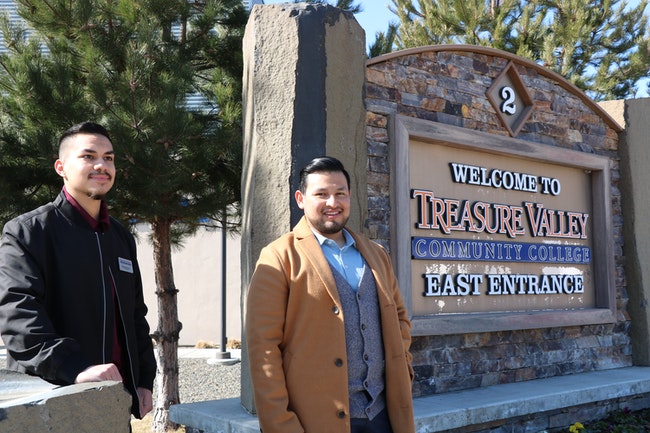
Noe Gonzalez (left), the High School Equivalency Program’s outreach and engagement specialist, and Daniel Liera-Huchim (right), coordinator of the English as a Second Language program, at Treasure Valley Community College. (Liliana Frankel/The Enterprise)
ONTARIO – Treasure Valley Community College this spring will offer classes in welding and computer science to students in the English as a Second Language program to better integrate them into campus life.
The initiative is significant because it’s the first time such courses have been offered for students of English as a Second Language. These introductory courses are funded by a grant from Oregon’s Higher Education Coordinating Commission and have no cost for students.
Program staff hope that by giving students the option to take one course for free, they are setting them up to earn a professional certificate from TVCC’s Career and Technical Education programs.
According to Daniel Liera-Huchim, who coordinates the English as a Second Language Program at TVCC, learning English can be a fraught process for many immigrants. They can fear they won’t be able to speak with relatives, he said.
But Liera-Huchim said that’s a “big stereotype” passed along by families.
“Language is a tool,” he said. “Lose the fear that your family will stop knowing Spanish because you’re learning English. On the contrary, your family’s going to be stronger because you know both languages.”
This winter term, 81 students gave English a try at TVCC. That’s a significant expansion of the program, which during the previous term served 14 students. A majority of the students are from Mexico, with others from El Salvador, Peru, Guatemala, Honduras, and Colombia. Most of the American students have parents who raised them at least partially abroad, Liera-Huchim said.
“It’s really exciting, just the community response we’ve had to the ESL program,” said Jann Bell, director of Adult Basic Skills at TVCC. She credited Liera-Huchim, hired in November, with an adept use of social media to grow the program.
The original grant to TVCC was to expand English as a Second Language through a series of outreach efforts at the Catholic churches in Nyssa and Ontario, both of which offer Spanish-language mass. Those efforts were canceled because of Covid.
Instead, Liera-Huchim created Facebook and Instagram pages for the program to foment what he called a “cohort feeling” amongst the students.
“As soon as you step into a classroom, they feel the atmosphere of what it is to be a traditional student,” Liera-Huchim said. “When they set foot into this institution, we want them to feel part of higher education.”
The introduction of the computer science and welding courses will further weave students into the fabric of campus life. The classes will be shared between a subset of English as a Second Language students and students of the High School Equivalency Program, which serves migrant farmworkers and their children. Each class counts toward an eventual certificate in either computer science or welding.
The classes will be conducted in English for three hours, two nights a week. That’s in addition to the other two nights a week that the English as a Second Language students have their regular classes.
And that commitment, for most students, comes after a full day of work.
Liera-Huchim said that during the winter, an estimated 80% of the program’s students work taxing physical jobs in onion sheds. Nonetheless, more than a dozen English as a Second Language students have made the commitment to attend the specialty classes this spring.
Liera-Huchim said that the program has created a culture of flexibility around work commitments that helps students feel secure. Program staff communicate with employers about allowing students to get off work a little early so they can get to class on time, and are tolerant with students who have to be late because of their jobs.
Among students, there’s solidarity in knowing that others share similar circumstances.
“Si salgo del trabajo y huelo mal? (If I get off work and I smell bad?) Doesn’t matter,” said Liera-Huchim. “We’re all in the same boat.”
Liera-Huchim said the primary reason that students decided to learn English was to obtain better jobs. While many students in the English as a Second Language program speak some English, either because they’ve lived in the U.S. for a long time or because they hold a degree from their home country, they are seeking to improve their vocabulary. Other reasons to learn English include participating more fully in a child’s schooling, relating to neighbors, and dealing with institutions.
“If you’re going to be here for the long run in this country, you might as well do it by understanding your surroundings and being able to defend your (ideas),” Liera-Huchim said.
News tip? Contact reporter Liliana Frankel at [email protected] or 267-981-5577.
YOU CAN SUPPORT THIS KIND OF WORK
The Enterprise relies on community support to fund vital local journalism. You can help us do more.
SUBSCRIBE: A monthly digital subscription is $5 a month.
GIFT: Give someone you know a subscription.
ONE-TIME PAYMENT: Contribute, knowing your support goes towards more local journalism you can trust.




